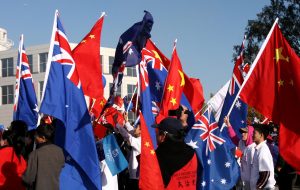Recent developments demonstrate Australia’s growing seriousness in combating Chinese influence and interference operations in the country amid a sharp downturn in Australia-China relations. Australia’s move to crack down on China’s use of academics and journalists to covertly promote Chinese Communist Party (CCP) positions is being watched intently across the Indo-Pacific as several other countries in the region grapple with similar challenges.
The latest salvo from Canberra in this direction comes in form of its recent decision to revoke the visas of two Chinese scholars, Chen Hong and Li Jianjun, on national-security grounds. Reporting this as part of a larger investigation on Chinese interference operations in Australia, Australian Broadcasting Corporation (ABC) claimed on September 9 that it had “uncovered the identities of senior Chinese journalists and academics who have been drawn into the joint investigation by the Australian Federal Police (AFP) and Australian Security Intelligence Organization (ASIO).”
On its part, China continues to jail a Chinese television presenter with Australian citizenship on unspecified security grounds. The last two remaining Australian journalists were allowed to leave China on September 8 after intense diplomatic wrangling between Beijing and Canberra (both men initially had last-minute exit bans placed on them, supposedly as part of a national security investigation). As ABC’s Tasha Wibawa notes, “For the first time since mid-1970s, there are no accredited Australian media journalists based in China.”
The extent to which China had managed to penetrate the Australian political space became internationally visible in December 2017 when the Labor Party’s Sam Dastyari quit the Australian Senate over improper ties with CCP-linked businesspeople. The year before, Dastyari had contradicted his party’s position on the South China Sea at Beijing’s behest. A landmark June 2017 ABC Four Corners/Fairfax Media investigation had shown that cases like Dastyari’s were instances of a much larger problem, where the CCP aggressively sought to shape favorable narratives in Australia through numerous shadowy means.
What is impressive about these developments over the past few years is the extent to which the Australian civil society – academics and think tank scholars included – has helped uncover malign CCP operations in their country and across the world, including and beyond influence and interference campaigns.
A 2018 book by scholar Clive Hamilton systematically uncovered CCP penetration in Australia. Hamilton had also detailed ways by which the CCP uses Chinese diaspora in Australia to promote China’s positions as well as keep a lid on dissenting voices. In an instance rich with irony, Sydney-based publisher Allen & Unwin cancelled the publication of “Silent Invasion,” Hamilton’s book, at the last minute, demonstrating the extent to which China continues to bear upon prominent international entities. (The book later appeared through a different publishing house, and has been a subject of much debate ever since.) Hamilton’s latest book, co-authored with a European researcher, Mareike Ohlberg, is global in scope though thematically similar to his previous work.
The Australian Strategic Policy Institute (ASPI), a Canberra-based think tank, has also helped painstakingly uncover opaque but systematic operations by CCP-linked entities to surreptitiously obtain scientific and technological information. In a report published in August, ASPI analyst Alex Joske mapped at least 600 Chinese “talent recruitment stations” around the world though which the CCP identifies and recruits individuals perceived to be useful in Beijing’s quest for technological domination. (I have discussed the background and context of the report in an earlier article.)

































